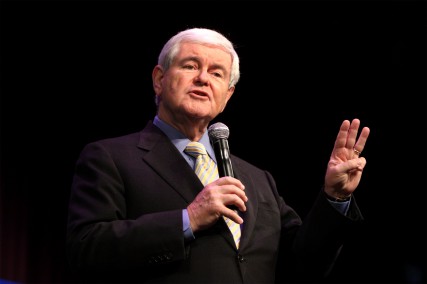
(RNS1-NOV30) Former House Speaker Newt Gingrich has been gaining ground among crucial evangelical voters, despite his three marriages. For use with RNS-GINGRICH-EVANGEL, transmitted Nov. 30, 2011. RNS photo courtesy Gage Skidmore.
(RNS) And so it has come to this.
Newt Gingrich, the career politician and millionaire “consultant” for the health care and mortgage industries, a twice-divorced and thrice-married convert to Catholicism, may be the last great hope of the religious right.
Granted, this is the Republican nominating contest for 2012, which means just about anything can happen, if it hasn’t already.
But Gingrich as the political savior of conservative Christians?
The numbers indicate that’s just what is happening as Republican voters continue to look yearningly past Mitt Romney and abandon Herman Cain’s fading campaign amid multiplying accusations of sexual impropriety.
Or, as The Atlantic’s Molly Ball put it, Gingrich’s personal baggage is “garden-variety adultery and lack of marital commitment,” which “looks downright tame next to what Cain’s been accused of.”
The result: Gingrich’s “positive intensity” among GOP voters — a key metric tracked by the Gallup Poll — has soared while Romney’s has tanked, leading to the widest disparity among the leading candidates so far this year.
More telling is Gingrich’s emergence from the pack in Iowa, a stronghold of the religious right, where he has a 28 percent approval rating to Romney’s 12 percent runner-up rank. And in South Carolina, Christian conservatives are helping Gingrich establish a commanding lead, 38-15 percent, over Romney.
About 40 percent of Republicans in both Iowa and South Carolina identify themselves as fundamentalist Christians or evangelicals, according to a recent NBC News/Marist poll.
Given Iowa’s first-in-the-nation vote on Jan. 3, and South Carolina No. 3 place on Jan. 21 after No. 2 New Hampshire, such faith-based support could prove to be a crucial factor in finally deciding who will be the Republican challenger to President Obama.
There are several reasons why Gingrich has emerged as an unlikely for the Christian right, and why he could have the kind of staying power that others have not:
Discerning voters
The first factor — and perhaps the least appreciated — is that when it comes to politics, conservative evangelicals are far from a bunch of wide-eyed rubes who can be mesmerized by a slick sermon, or stump speech.
“This is a group of voters that has been active in presidential politics for a while now,” said John Green, an expert on religion and politics at the University of Akron’s Bliss Institute. “Some evangelicals look at religion, some look at the issues, some look at electability. So they have a number of criteria that they apply.”
Certainly, evangelical suspicions about Romney’s Mormonism come into play, but added to that are deep concerns about the consistency of Romney’s conservatism, and his failure to court social conservatives — two problems Gingrich does not have.
Green and others also note that the religious right hasn’t fallen in love with a candidate since George W. Bush’s 2004 reelection campaign. Since then, these “values voters” have grown accustomed to looking around, and they may well be content with the sadder-but-wiser candidate as long as he can win.
“Under normal circumstances, Gingrich would have some real problems with the social-conservative community,” Tony Perkins, head of the Family Research Council, told The Daily Beast. “But these aren’t normal circumstances.”
A modern-day ‘King David’
Certainly that is the line that Gingrich has been pitching.
“I don’t claim to be the perfect candidate,” Gingrich said during a recent radio interview in South Carolina, where his meetings with rock-ribbed Christian leaders have been bearing fruit. “I just claim to be a lot more conservative than Mitt Romney and a lot more electable than anybody else.”
By embracing rather than running away from his past sins, Gingrich is both playing up the kind of “authenticity” that he is famous for — and that voters don’t find in Romney — and he is playing to a Christian narrative that retains great power in the American religious imagination.
“They were willing to take Gingrich’s account that he was a changed man at face value because the drama of sin and redemption is something that fits very well with evangelicalism,” Green said.
Gingrich has doubled-down on that bet by adding a section to his campaign website about his checkered personal past, saying that he “has been honest and forthright about the fact that he has had moments in his life that he regrets, that he has had to seek reconciliation, and go to God for forgiveness.”
So far, that approach seems to be working.
“I see a lot of parallels between King David and Newt Gingrich, two extraordinary men gifted by God, whose lives include very high highs and very low lows,” Steve Deace, an influential conservative radio host in Iowa, told The Daily Beast.
Unfinished business
Still, the remaining month before the Iowa caucuses is an eternity in this primary campaign, and many conservative pundits are still appalled at Gingrich’s unexpected resurgence.
“Gingrich’s serial adultery and his current hypocrisy suggest not a immoral man, but an amoral one,” the Washington Post’s Jennifer Rubin wrote in a classic blast this week.
In addition, he hasn’t closed the deal with social conservatives. Richard Land, an influential Southern Baptist leader, posted an open letter to Gingrich congratulating him on his return “from the political equivalent of hospice care” but warning that he still has work to do to win over evangelical women.
Land suggested Gingrich find “a pro-family venue and give a speech (not an interview) addressing your marital history once and for all.” It might not convince everyone, Land said, but might change enough minds among evangelicals who are “immersed in a spiritual tradition of confession, redemption, forgiveness and second and third chances.”
And that, in the end, might be just enough to make Gingrich the nominee.




